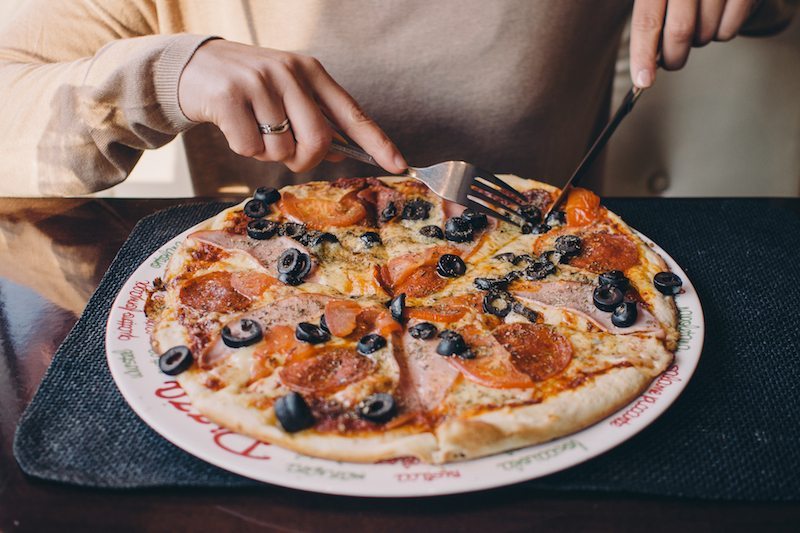Food and I have a complicated relationship. It’s always been my go-to. Sad? Eat ice cream. Celebrating? Bake a cake. Special one-on-one time with my kiddo? Go out for breakfast. Catching up with a friend? There’s a Mexican restaurant for that. Food isn’t only for survival or celebration; it’s for boredom, comfort, and coping.
And I have plenty of legitimate excuses for eating carelessly or not exercising self-control: I’m busy, I have a big family with several picky eaters, and I’d rather spend time on ministry than meal planning.
My desire to eat as a response to every situation and my ready excuses have resulted in a lifelong battle with my weight, obsessive calorie-counting, scale obsession, yo-yo dieting, weight-related identity issues, and eating disorders. But at the root of my food problems are heart issues that can’t be diagnosed or excused by a doctor. In fact, these heart issues are more painful and problematic than any of my physical ailments. Sin, idolatry, guilt, and shame—they’re all on the menu.
At the root of my food problems are heart issues that can’t be diagnosed or excused by a doctor.
More than a ‘Struggle’
The apostle Paul doesn’t mince words when it comes to matters of food and drink: “I will not be dominated by anything. ‘Food is meant for the stomach and the stomach for food’” (1 Cor. 6:12). Jesus is Paul’s only master. My “food struggles,” then, aren’t just pesky annoyances—they’re masters competing for lordship in my life. When I decide to eat whatever I want, whenever I want, I crown food and place it on a throne meant only for Jesus.
Let me be clear about what I’m not saying. Body weight is not a measure of my holiness, and weight loss (or gain) can neither save my soul nor commend me to God. Countless physical factors can contribute to changes in my physical body. What I am saying is that my battle isn’t against the bathroom scale or mirror; it’s against food idolatry and its sidekicks gluttony and self-indulgence. If I want to stop walking like an enemy of Christ, whose end is destruction and whose god is the belly (Phil. 3:19), I have to call my “struggle” what it really is—sin.
When I decide to eat whatever I want, whenever I want, I crown food and place it on a throne meant only for Jesus.
When I recognize my food idolatry for what it is—a long-term struggle with sin—I can be tempted to give up on myself and assume Jesus has grown weary of helping me. But this is faithlessness. Jesus came so we might have abundant life. I’m confident the life he offers is so much more satisfying than a life of endless carbs and calories. So why do I perpetually settle for less?
Because I forget there’s hope, even for me.
Power of Jesus
I often feel like the woman in Luke 8:43 who bled for 12 years. For most of my life I’ve felt weary, hopeless, and desperate for help. Having exhausted all my earthly resources in the way of diets, exercise, doctors, and medications, I know I need the same touch from the Savior. But my own (dog-returning-to-its-vomit) propensity to sin must never keep me from pressing in and reaching desperately toward Jesus—the only one who saves.
Jesus’s responded to the bleeding woman with compassion: “Daughter, your faith has made you well; go in peace” (Luke 8:48). She received instant healing; changing my eating habits is a lot more nuanced and complicated. But Jesus’s power isn’t nuanced or complicated. His power to simply stop her bleeding is exactly the same power that leads me (each and every time) to confess sin, to desire and pursue holiness, and to achieve victory over temptation.
Go in Peace
I don’t know if I’ll ever win a final victory in the war against food idolatry this side of heaven. I expect I may be fighting for the long haul, since food sins most easily entangle me. But even though food idolatry is a roaring lion crouching at my refrigerator door, I’m learning to fight and defend myself. I’ve tasted glimpses of freedom, and I’m learning food isn’t my enemy; sin is. And our Bibles have plenty of specific encouragement for fighting sin if we’re honest about confessing it.
The forgiveness I receive by grace, through faith in Christ’s sacrifice on my behalf, offers me hope for two things. First, I have hope and assurance that God forgives me for my food idolatry. I no longer stand condemned. And second, I have hope that he who began a good work in me will be faithful to finish it, conforming me to the image of Christ by restoring a healthier—and yes, holier—relationship with food.
Our Bibles have plenty of specific encouragement for fighting sin if we’re honest about confessing it. . . . [But] even if every meal plan, diet, or ‘lifestyle modification’ you’ve ever attempted has failed you, Jesus won’t.
The abundant life we’re promised through Christ is filled with the sin-conquering power of the Holy Spirit. Even the most out-of-control eater can find the hope of being transformed and made new. Even if every meal plan, diet, or “lifestyle modification” you’ve ever attempted has failed you, Jesus won’t.
Taste and see that the LORD is good! Blessed is the man who takes refuge in him (Ps. 34:8).
